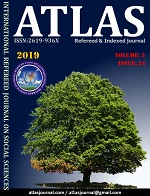TOURISM REVENUES-BUSINESS CYCLES RELATIONSHIP: EU COUNTRIES AND TURKEY CASE
DOI:
https://doi.org/10.31568/atlas.360Keywords:
Business Cycles, Tourism Revenues, Panel Data MethodsAbstract
With the acceleration of financial liberalization after the 1980s, the frequency and duration of business cycles in the world have increased; the right assumptions about the periods of contraction and expansion have become more and more important in terms of countries. Business cycles that are moving along with a large number of macroeconomic variables undoubtedly affect the tourism industry, which is one of the fastest growing sectors in the world since the middle of the last century. The concept is used not only at the economic level but at the same time in relation to political and political developments. Therefore, the 2011 European debt crisis and the recent political developments between Turkey and the EU countries could affect the economic conjuncture. The relationship between conjuncture fluctuations and tourism revenues in this study is analyzed using panel data methods for EU countries and Turkey for the period 1995-2015. Findings show that tourism revenues are procyclical.
Downloads
Published
How to Cite
Issue
Section
License

This work is licensed under a Creative Commons Attribution-NonCommercial 4.0 International License.


